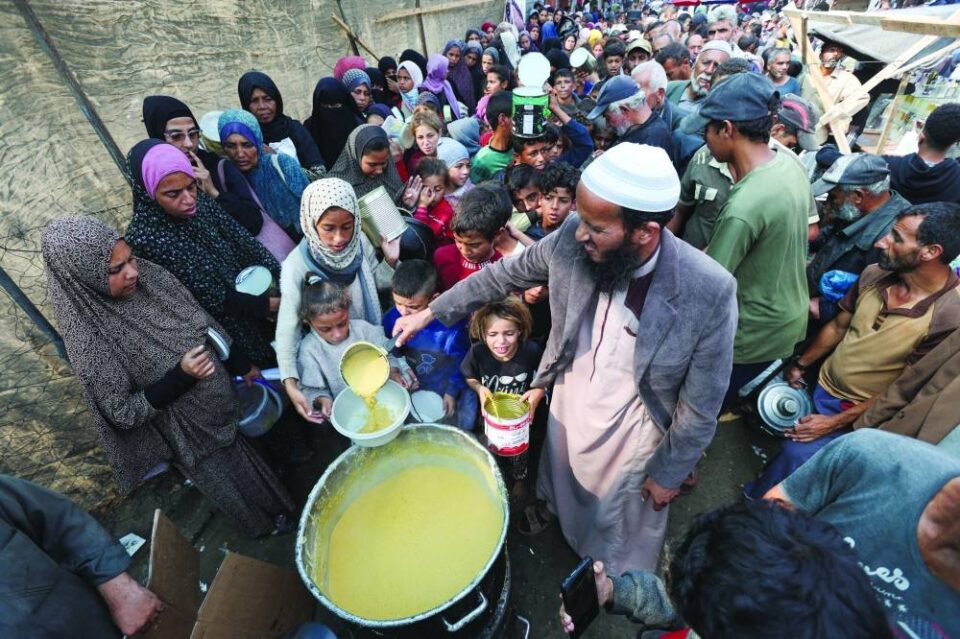After surviving more than a year of war in Gaza, Aisha Khaled is now afraid of dying of hunger if vital aid is cut off next year by a new Israeli law banning the UN Palestinian relief agency from operating in its territory.The law, which has been widely criticised internationally, is due to come into effect in late January and could deny Khaled and thousands of others their main source of aid at a time when everything around them is being destroyed.“For me and for a million refugees, if the aid stops, we will end. We will die from hunger not from war,” the 31-year-old volunteer teacher told the Thomson Reuters Foundation by phone.“If the school closes, where do we go? All the aspects of our lives are dependent on the agency: flour, food, water…(medical) treatment, hospitals,” Khaled said from an UNRWA school in Nuseirat in central Gaza.“We depend on them after God,” she said.UNRWA employs 13,000 people in Gaza, running the enclave’s schools, healthcare clinics and other social services, as well as distributing aid.Now, UNRWA-run buildings, including schools, are home to thousands forced to flee their homes after Israeli air strikes reduced towns across the strip to wastelands of rubble.UNRWA shelters have been frequently bombed during the year-long war, and at least 220 UNRWA staff have been killed.If the Israeli law as passed last month does come into effect, the consequences would be “catastrophic,” said Inas Hamdan, UNRWA’s Gaza communications officer.“There are 2mn people in Gaza who rely on UNRWA for survival, including food assistance and primary healthcare,” she said.The law banning UNRWA applies to the Israeli-occupied West Bank, Gaza and Arab East Jerusalem, areas Israel captured in 1967 during the Six-Day War.Israeli lawmakers who drafted the ban cited what they described as the involvement of a handful of UNRWA’s thousands of staffers in the attack on southern Israel last year that triggered the war and said some staff were members of Hamas and other armed groups.FRAGILE LIFELINEThe war in Gaza erupted in the first week of October 2023, when Hamas fighters stormed Israel.Israel’s military campaign has levelled much of Gaza and killed around 43,500 Palestinians, Gaza health officials say. Up to 10,000 people are believed to be dead and uncounted under the rubble, according to Gaza’s Civil Emergency Service.Most of the strip’s 2.3mn people have been forced to leave their homes because of the fighting and destruction.The ban ends Israel’s decades-long agreement with UNRWA that covered the protection, movement and diplomatic immunity of the agency in Israel, the West Bank and the Gaza Strip.For many Palestinians, UNRWA aid is their only lifeline, and it is a fragile one. Last week, a committee of global food security experts warned there was a strong likelihood of imminent famine in northern Gaza, where Israel renewed an offensive last month.Israel rejected the famine warning, saying it was based on “partial, biased data”.COGAT, the Israeli military agency that deals with Palestinian civilian affairs, said last week that it was continuing to “facilitate the implementation of humanitarian efforts” in Gaza.But UN data shows the amount of aid entering Gaza has plummeted to its lowest level in a year and the United Nations has accused Israel of hindering and blocking attempts to deliver aid, particularly to the north.“The daily average of humanitarian trucks the Israeli authorities allowed into Gaza last month is 30 trucks a day,” Hamdan said, adding that the figure represents 6% of the supplies that were allowed into Gaza before this war began.“More aid must be sent to Gaza, and UNRWA work should be facilitated to manage this aid entering Gaza,” she said.‘BACKBONE’OF AID SYSTEMMany other aid organisations rely on UNRWA to help them deliver aid and UN officials say the agency is the backbone of the humanitarian response in Gaza.“From our perspective, and I am sure from many of the other humanitarian actors, it’s an impossible task (to replace UNRWA),” said Oxfam GB’s humanitarian lead Magnus Corfixen in a phone interview with the Thomson Reuters Foundation.“The priority is to ensure that they will remain…because they are essential for us,” he said.UNRWA supports other agencies with logistics, helping them source the fuel they need to move staff and power desalination plants, he said.“Without them, we will struggle with access to warehouses, having access to fuel, having access to trucks, being able to move around, being able to coordinate,” Corfixen said, describing UNRWA as “essential”. UNRWA schools also offer rare respite for traumatised children who have lost everything.Twelve-year-old Lamar Younis Abu Zraid fled her home in Maghazi in central Gaza at the beginning of the war last year.The UNRWA school she used to attend as a student has become a shelter, and she herself has been living in another school-turned-shelter in Nuseirat for a year.Despite the upheaval, in the UNRWA shelter she can enjoy some of the things she liked doing before war broke out.She can see friends, attend classes, do arts and crafts and join singing sessions. Other activities are painfully new but necessary, like mental health support sessions to cope with what is happening.She too is aware of the fragility of the lifeline she has been given. Now she has to share one copybook with a friend because supplies have run out. “Before they used to give us books and pens, now they are not available,” she said.

previous post